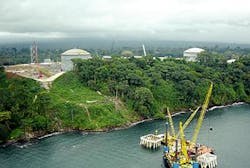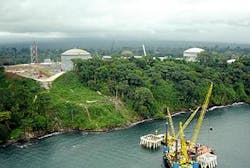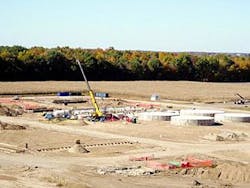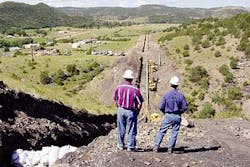Project plans respond to market demands for more, cleaner fuels
When asked to list the most important issues facing downstream oil and gas engineering and construction companies now and in the beginning of 2006, Ahmad Fatemizadeh, president of Shaw Stone & Webster Process Technology Group, talked about fast-paced scheduling and the EPC risk.
In 2005, engineering and construction services, he said, have reached a level not seen since the 1970s. “Our refining clients are requiring fast-paced schedules with firm guarantees.
“EPC contractors are being asked to bear a disproportionate amount of risk vs. rewards.”
Fatemizadeh explained that one solution has been to develop mutually beneficial relationships through innovative project execution plans. He added that retaining and recruiting engineering talent who are in tune with current industry trends is a vital part of that plan.
“Refining is currently a high-margin business and there is considerable effort to use some of those profits in asset management to realize reliable operations,” he said.
This culture, according to Fatemizadeh, appears to have been translated into the execution of EPC projects, resulting in tight schedules and low margins for contractors.
EPC contractors must look at low-cost execution options, such as regional offices staffed with personnel made available due to downsizing and cost cutting by the refiners themselves.
Also, Fatemizadeh pointed out that most refining technologies are mature. New developments are based on catalyst technology. Subsequently, Shaw’s focus has been to partner with catalyst development organizations such as Axens SA, Total SA, and Chinese organizations that have broad refining technology portfolios.
When asked about grassroots refineries in the US, Fatemizadeh pointed out that there should be at least one major refinery built in the US. He also expects there will be more expansion projects in the existing refineries to help meet the growing need for gasoline and distillate products.
A deterrent to new refinery construction, he said, is the high capital investment, as much as $16,000/bbl for a complex facility. A modern refinery must be designed to process heavy, high-sulfur crudes and to provide flexibility to a wide range of refined products. An added cost is the investment needed to meet local environmental regulations.
However, by incrementally growing conversion capacity through low-cost techniques, such as coking, US refiners can match or exceed demand growth. Fatemizadeh advises operators to carefully evaluate technologies using advanced catalysts and proprietary equipment to take advantage of the increase in light-heavy crude spreads.
Since 1994, 625,000 b/d of new coker capacity has been added in the US. The simple reason is that the margins with cokers are better than hydrocrackers so refiners go for lower capex and better margins, according to Fatemizadeh.
Taking advantage of the trend, ConocoPhillips and Bechtel Corp. have signed a heads of agreement for worldwide collaboration to facilitate the licensing and marketing of ConocoPhillips’s proprietary ThruPlus delayed-coking technology. Bechtel will promote ConocoPhillips as the preferred provider of delayed-coking technology with current and prospective clients.
Likewise, ConocoPhillips will promote Bechtel as the preferred contractor for the engineering, procurement, and construction of delayed cokers using the ThruPlus Coking Process.
According to Oil & Gas Journal’s latest exclusive semiannual survey of worldwide petroleum industry construction plans and ongoing projects, the recently passed energy bill will give a boost to increased refining capacity.
Placid Refining Co. LLC, Port Allen, La., for example has a strategy to increase capacity, encouraged by the bill.
“We’ll be increasing our crude rate this year, as the energy bill took away a tax disincentive for our owners to run anything over 50,000 b/d, and we’ve been able to do 50,000 b/d consistently,” states a Placid Refining representative.
He explained that previously any crude producer who owned an interest in a refining company that exceeded 50,000 b/d throughput on any single day would lose certain tax benefits associated with its crude production. The impact of losing those benefits more than offset any increased profits the refinery could make with a few incremental barrels of throughput. Refiners, therefore, designed and ran for 49,999 b/d.
With the passage of the energy bill, the basis associated with that tax law changed to 75,000 b/d on a calendar-year average.
“As of Aug. 8, 2005, when the bill was signed into law,” he said, “we’ve been doing what we can to increase rates. We even took a short outage to debottleneck a unit, hence the increase. Luckily, the downstream units had a little unused capacity, so we were able to process the bulk of the intermediates.”
Further details of these and the following projects are included in the exclusive OGJ Worldwide Construction Update tables available online at www.ogjonline.com.
Refining
Refiners worldwide are planning new or expanded coking units.
In the US, Cenex Harvest States plans to invest $325 million to install a coker and perform other process modifications to its 55,000-b/d Laurel, Mont., refinery. Tesoro Corp. plans to add a 15,000-b/d coker at its Anacortes, Wash., refinery.
Elsewhere in the Americas, Suncor Energy Inc., Calgary, will build a new delayed coker at its Fort McMurray oil sands upgrader in northern Alberta. And a consortium led by Chile’s Empresa Nacional del Petroleo agreed to finance, build, and operate a $430 million, 20,000-b/d delayed coker at the 94,000-b/d Aconcagua refinery at Concon, Chile.
Petroleos Brasileiro SA (Petrobras) plans a 31,000-b/d delayed coking unit at its Presidente Getulio Vargas refinery in Araucaria, Parana, Brazil. Petrobras has delayed-coking projects planned for its Alberto Pasqualini, Duque de Caxias, and Henrique Lage refineries.
In Europe, BP Oil Refineria de Castellon SA, a unit of BP PLC, let a contract to Foster Wheeler USA Corp. to supply a process design package for a 20,000-b/d delayed coking unit in Spain.
In India, Reliance Industries Ltd. plans to invest $5.7 billion in an expansion at its Jamnagar refinery that will nearly double production to 1.2 million b/d. The Jamnagar facility is India’s only refinery capable of producing Euro III class fuels and can accommodate any class of crude from any region in the world.
Petrochemicals
Several new or expanded ethanol projects are planned in Canada.
One of the more notable is Commercial Alcohols Inc.’s $150 million Varennes project. Upon completion the ethanol plant will be capable of converting more than 12 million bushels of corn into more than 120 million l./year of fuel-grade ethanol.
PetroCanada Inc. has agreed to purchase the fuel-ethanol output for its manufacture and distribution of ethanol-enhanced gasoline. Canada wants to ensure that 35% of gasoline sold in Canada will contain at least 10% ethanol by 2010.
Husky Oil Marketing Co., the only retailer of ethanol-blended fuels in western Canada, plans to build a 130-million l./year plant in Saskatchewan. The new plant will be adjacent to its heavy oil upgrader at Lloydminster. Husky also plans to expand its Minnedosa facility to 80 million l./year from 10 million of ethanol.
Also, NorAmera BioEnergy Corp. plans to convert the Weyburn, Sask., distillery into a state-of-the-art ethanol plant, at a cost of $20 million, to produce 25 million l./year of fuel-grade ethanol.
Okanagan Biofuels will also convert an existing distillery in Kelowna, Ont., to produce 110 l./year. More ethanol facilities are planned for Collingwood, Ont., and Red Deer, Alta.
In the US, US BioEnergy Corp. plans to build Minnesota’s largest ethanol plant in Waseca County near Janesville. The plant will produce 378 million l./year of ethanol. The company has two plants currently under construction, one in Iowa and the other in Michigan.
Gas processing
In gas processing construction news, ConocoPhillips has several LNG plans proposed or under development. The company began construction of its 1.5-bcfd Freeport, Tex., terminal in January. It will be completed in 2007.
The company is also in the permitting process for a 1-bcfd terminal off Alabama and a 1.5-bfcd terminal off Louisiana.
Outside the US, ConocoPhillips plans a 3 million tonne/day (tpd) plant at Darwin, Australia, a 10 million tpd plant in Nigeria, a 7.8 million tpd plant at the Ras Laffan complex in Qatar, and is pursuing opportunities with partners in Russia and Venezuela.
Announced in June, Enterprise Products Partners LP will construct a new NGL fractionator at Hobbs, NM. The fractionator will handle as much 75,000 b/d of mixed NGL. The project costs $130 million and will be completed mid-2007.
Gas-to-liquids
In September, Trinidad and Tobago approved construction of a $100 million GTL plant to be built at Pointe-a-Pierre in southern Trinidad and Tobago. The plant will start producing 2,250 b/d of high-quality diesel in 2007.
Sasol Ltd. of South Africa announced that it is evaluating several new GTL projects, one of which will be located in Algeria. In association with the Algerian Ministry of Mines & Energy, along with Sonatrach, Sasol is soliciting bids for a 34,000-b/d plant to be built at Arzew.
Qatar Shell GTL Ltd. is moving forward with its plans for a GTL project at Ras Laffan, Qatar. The company issued tender documents for wellhead platforms and pipeline in two offshore packages for the Pearl GTL project. The project requires an investment of $6 billion for the twin 70,000-b/d trains, with start-up in 2009.
Sulfur
Black & Veatch of Overland Park, Kan., reported involvement with several sulfur projects in the engineering phase or under construction.
A Claus project in Panipat, India, will process 225 tpd of sulfur from refinery acid gas for Indian Oil Corp.
BP plans a 30-tpd facility for the Grangemouth, Scotland, refinery; a 125-tpd plant for the Cherry Point, Wash., refinery; and a 136-tpd facility for the Coryton (UK) refinery.
AGIP KCO tapped Black & Veatch as contractor for its 1,900-tpd Claus sulfur recovery and tail-gas treating plant in Kashagan, Kazakhstan.
Black & Veatch is working to complete other sulfur recovery plants in Indonesia, Puerto Rico, China, and Taiwan.
Pipelines
Bechtel Corp. reported several pipeline projects around the world, including gas pipelines in Thailand and Trinidad and Tobago, and a products pipeline in Malaysia.
In Canada, Enbridge Inc.’s Gateway Pipeline Inc. is initiating engineering work for its proposed development of two new pipelines as part of the Enbridge Gateway Project. The crude oil pipeline will transport oil sand production from Edmonton to a new marine terminal at Kitimat, BC. The pipeline will also transport condensate from the terminal to Edmonton.
In the US, Kinder Morgan Energy Partners and Sempra Energy plan a $3 billion gas pipeline from Wyoming to Ohio. The companies will build the 1,500 mile, 42-in. pipeline to move 2 bcfd of gas. ✦



